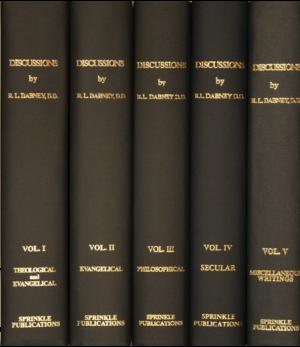
The great Southern Presbyterian theologian Robert Lewis Dabney has been mentioned a number of times on this site. It is a very telling indication of our times that such a visionary man is so little known, and usually slandered when mentioned at all. You can find the entire collection of his written works at the Dabney Archive, all of which are well worth reading. However, such a massive undertaking can be a bit overwhelming, and so on Sundays I will begin posting bite-sized excerpts from Dabney’s works with perhaps a little bit of my own commentary. This will be done in hopes of promoting wider readership for this great man.
The following excerpt is taken from a speech given by R.L. Dabney at the Annual Commencement of Hampden Sidney College on June 15, 1882, entitled “The New South.” In the speech, he discusses some of the factors which led to the destruction of the original American form of government, one of which was the tendency towards universal suffrage.
One more change only, my time permits me to state, which concurs to render the system of our fathers a thing of the past. This is the invariable extension of the suffrage, which has attended every political change in America. This trait has characterized not only the violent revolution through which we have passed, but every modification of constitution made by the States. We even see it working with equal certainty in the reform measures of once conservative England. In every case where a State constitution has been opened to change, that change has been towards universal suffrage, unless this extreme had been already reached; and in no single case has a restriction of suffrage been even attempted. There is a reason for this fated law of progress downwards in the nature of the demagogue, and it may be said in passing, that this presents us the fatal weak pDint in the theory of popular government.
The selfish calculations and instincts of these courtiers of King Mob, always prompt them to advocate every extension, no matter how unwise or destructive, and seal their lips from opposing it. Their calculation runs thus: Here is a new class whom some one has proposed to enfranchise. I know, as does every sensible man, that it is a folly. But perhaps the proposal may prevail. Hence, I cannot afford to oppose it, for should it prevail, the newly enfranchised, when they come to the polls, will remember my action against me. But if I am a forward advocate of it, their gratitude will make them vote for me. Thus the craziest and most ruinous proposition to create a new class of voters, always has zealous assertors, and for the same reason it meets with no opposers who are effective.
Such were the avowed motives (with sectional hatred and revenge) which prompted our conquerors to fix on the Southern half of the country that last extreme of political madness, the universal and unqualified suffrage of the slaves. And how deadly in their potency these motives of self-seeking are, we may see in this fact, that they even silence the protest of our own politicians! There is not one of them who does not know that this measure is inevitably pregnant with the corruption and overthrow of honest, popular government; yet there is not one of them, who is a candidate for votes, who has the nerve to say what he thinks, or to demand a reversal of the criminal blunder. But when the leaders of the very people who are the first victims of this wrong, are too much intimidated to lift a finger for its correction, whence shall deliverance from, the fatal incubus come? There will be no deliverance until suffrage shall have been so foully corrupted by this and its other perversions, that a despairing and ruined people take refuge from its intolerable tyrannies in the will of an autocrat, and the ignorant and venal cease to vote only when and because all will be forbidden to vote.
Anyone who looks at the voting records of those groups given the vote after the War Between the States will see how very prophetic Dabney was.
| Tweet |
|
|
|




